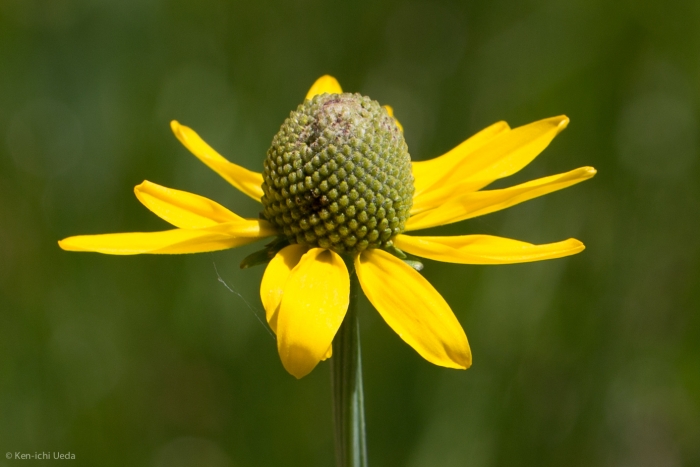Waxy Coneflower
(Rudbeckia glaucescens)
Waxy Coneflower (Rudbeckia glaucescens)
/
/

Ken-ichi Ueda
CC BY 4.0
Image By:
Ken-ichi Ueda
Recorded By:
Copyright:
CC BY 4.0
Copyright Notice:
Photo by: Ken-ichi Ueda | License Type: CC BY 4.0 | License URL: http://creativecommons.org/licenses/by/4.0/ | Rights Holder: Ken-ichi Ueda | Publisher: iNaturalist | Date Created: 2020-07-29T14:15:40-07:00 |
























Estimated Native Range
Summary
Rudbeckia glaucescens, commonly known as Waxy Coneflower or Glaucescent Black-eyed Susan, is a deciduous perennial herb native to the open woodlands, forest edges, and meadows of Western North America, particularly in Oregon and Northern California. It typically grows at a moderate rate to a height of 3-5 feet (0.9-1.5 meters) and a width of 1-2 feet (0.3-0.6 meters). The plant features lance-shaped, glaucous leaves and bears large, daisy-like flowers with bright yellow rays and a prominent, raised central cone that is usually purplish-brown. These flowers are quite showy and bloom from mid-summer to fall, attracting pollinators such as bees and butterflies.
The Waxy Coneflower is valued for its long blooming period and its ability to adapt to a variety of garden settings. It is often used in perennial borders, wildflower gardens, and as cut flowers due to its attractive blooms. This species is relatively easy to maintain, requiring medium amounts of water and thriving in full sun to part shade. It prefers medium draining clay or loam soils but is adaptable to different soil types as long as they are well-drained. While generally disease-resistant, it can be susceptible to powdery mildew and should be spaced properly to ensure good air circulation. Rudbeckia glaucescens is not known for being invasive and does not typically present problems with aggressive roots or other cultivation issues.CC BY-SA 4.0
The Waxy Coneflower is valued for its long blooming period and its ability to adapt to a variety of garden settings. It is often used in perennial borders, wildflower gardens, and as cut flowers due to its attractive blooms. This species is relatively easy to maintain, requiring medium amounts of water and thriving in full sun to part shade. It prefers medium draining clay or loam soils but is adaptable to different soil types as long as they are well-drained. While generally disease-resistant, it can be susceptible to powdery mildew and should be spaced properly to ensure good air circulation. Rudbeckia glaucescens is not known for being invasive and does not typically present problems with aggressive roots or other cultivation issues.CC BY-SA 4.0
Plant Description
- Plant Type: Herb
- Height: 3-5 feet
- Width: 1-2 feet
- Growth Rate: Moderate
- Flower Color: Yellow
- Flowering Season: Summer, Fall
- Leaf Retention: Deciduous
Growth Requirements
- Sun: Full Sun, Part Shade
- Water: Medium
- Drainage: Medium
Common Uses
Border Plant, Butterfly Garden, Low Maintenance
Natural Habitat
Native to open woodlands, forest edges, and meadows of Western North America
Other Names
Common Names: Glaucescent Black-eyed Susan
Scientific Names: , Rudbeckia glaucescens, Rudbeckia californica var. glauca,
GBIF Accepted Name: